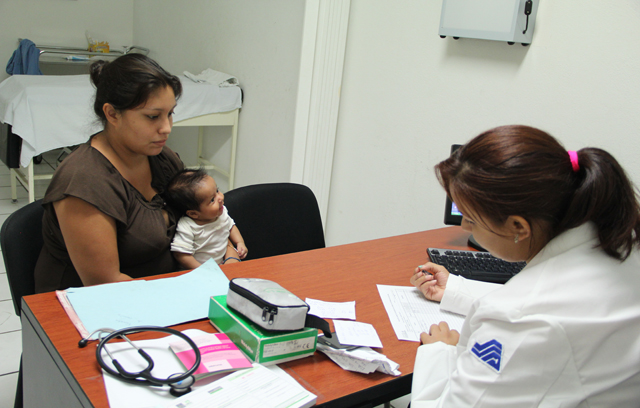IFPRI’s recent 40th anniversary provides an opportunity to take stock of the Institute’s policy influence and impact over the years. Has IFPRI been a worthwhile undertaking? What does available evidence tell us about IFPRI’s impact on food policies? How can we increase IFPRI’s influence in the future? This series of posts explores the research gauging the impact of our programs around the world.
Social protection and safety net programs provide benefits—food, cash, jobs—to vulnerable groups as a way to reduce poverty and hunger and improve people’s livelihoods. What are the most effective interventions? How can these programs better help the poor and food-insecure.
IFPRI’s work on social protection has gone by different names over the years—but its main focus has remained evaluating nutrition-related programs and building global knowledge. IFPRI has emphasized the importance of quantitative analysis of program impacts as the best basis for improving the design, implementation, and evaluation of large-scale interventions that aim to build human capital and reduce poverty.
A recent impact evaluation (written by Suzanne Nelson, Tim Frankenberger, Vicky Brown, Carrie Presnall, and Jeannie Downen) looks at IFPRI’s research and capacity building for social protection programs, and the impact of that work in partner countries from 2000–2012. The evaluation provides a broad assessment of IFPRI’s work, both globally and in pioneering national programs in Bangladesh, Brazil, Ethiopia, Mexico, and Nicaragua. To assess IFPRI’s impact, the study looked at publications, stakeholder perceptions, case studies, and policy and programming changes that resulted from IFPRI-supported research, capacity strengthening, or changes in policy that resulted from IFPRI’s research.
Mexico’s social protection program, called PROGRESA in its early years and now known as Prospera, is a conditional cash transfer program that provides money transfers to poor households if they take advantage of maternal and child preventative health and nutrition services and enroll children in school. At the Mexican government’s request, IFPRI evaluated the program early in its lifetime, in the 1990s. The findings led to improvements in the program’s survey instruments, better targeting of the poor, and to its expansion beyond small rural communities. On a larger scale, IFPRI’s work with PROGRESA was key to convincing the government of the need to use high-quality evidence in the design of social protection programming and policies.
IFPRI’s work also aided in the design of Nicaragua’s Red de Protección Social (Social Protection Network). Based on IFPRI-generated evidence, Nicaragua improved the safety-net program by eliminating a weight-gain requirement, increasing communications and monitoring, using geographic rather than household targets, and providing a small benefit for teachers. IFPRI’s evaluation of Brazil’s Bolsa Família conditional cash transfer program, meanwhile, found it increased both school attendance and the number of prenatal visits for pregnant women. But there was still room for improvement—Bolsa Família changed its targeting approach and introduced a monitoring and evaluation system based on IFPRI’s work.
In the 1990s, IFPRI conducted an evaluation of Bangladesh’s Rural Rationing Program. Based on the evidence provided by IFPRI, the rationing program was replaced with a food-for-work program. Under this new system, a monthly ration of grain was provided to poor households conditioned on school attendance by primary-aged students. IFPRI conducted several more assessments of this program in the following years, which helped the government of Bangladesh to make informed policy decisions about its educational systems, stipends, and transfers.
Beyond program impacts within individual countries, IFPRI’s work has also contributed to the development of a global “evaluation culture” for safety net programs, facilitating better design and implementation. PROGRESA, for example, served as a model in Latin America, as well as several countries in Asia and Africa. And studies comparing the impact of different social safety net programs on school outcomes, food security, and livelihoods shaped the World Food Programme’s social protection policy. Evaluations including IFPRI’s work in Ethiopia have also helped secure donor support.
IFPRI has provided high quality, evidence-based research on a wide range of topics related to social protection—contributing to the global body of knowledge—and its work has been very well-received and cited. Over 350 publications on social protection produced by IFPRI—from journal articles to policy briefs—provide a substantial public good. But IFPRI could do more to make sure that its work has impact on the ground. The impact evaluation pointed to several ways IFPRI could increase the impact of its work:
- Greater investment is needed to build capacity for designing, implementing, and evaluating social protection interventions, which is lacking in many countries.
- Policy research could have greater impact on the ground if IFPRI partnered with a broader mix of organizations that have the necessary skills to put research into action through advocacy and implementation.
- IFPRI could take on a stronger leadership role in social protection, given the positive reception of its evidence-based work among the donor community. Greater involvement in the global dialogue on this topic could help IFPRI become a leader in setting the agenda for social protection programs and get the results of IFPRI’s research into the hands, and minds, of policy makers.
Pamela Stedman-Edwards is publications team leader in the Communications and Knowledge Management Division at IFPRI.







